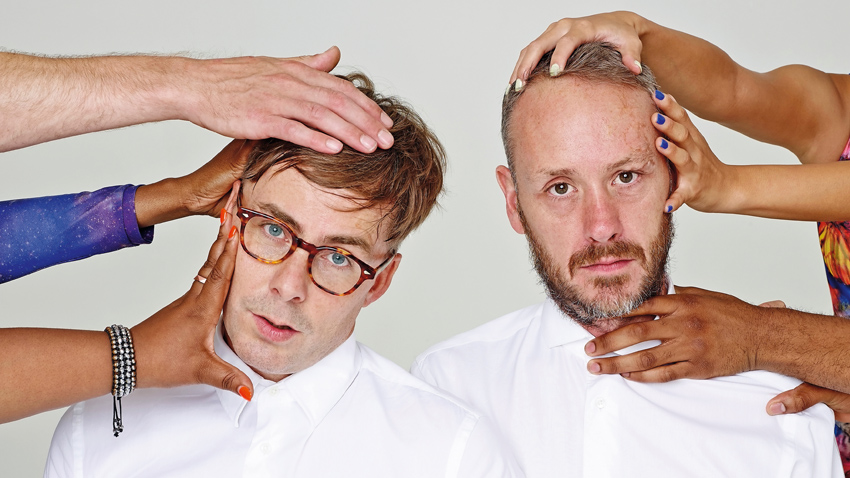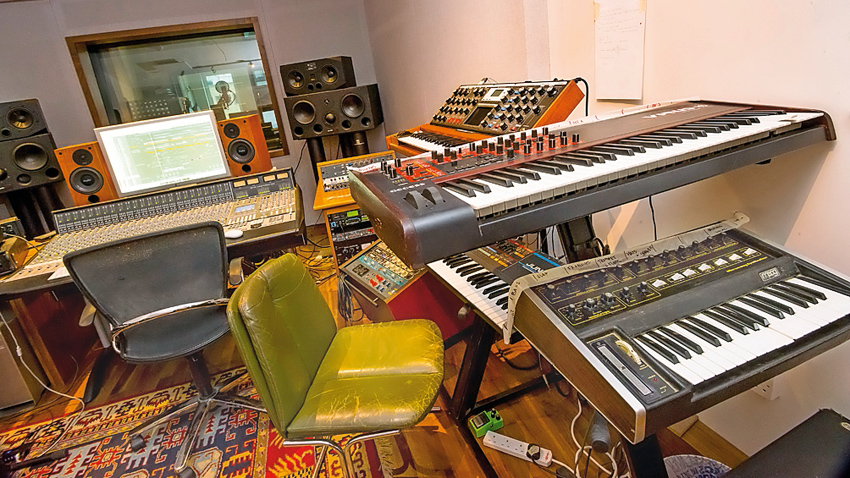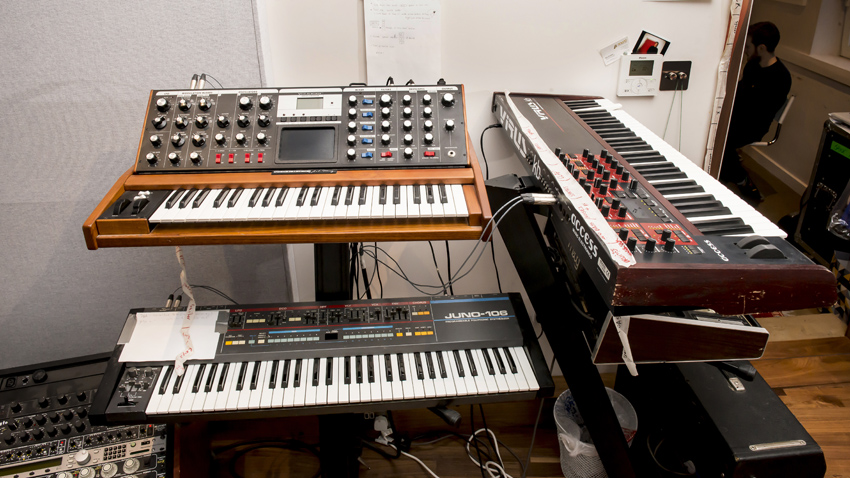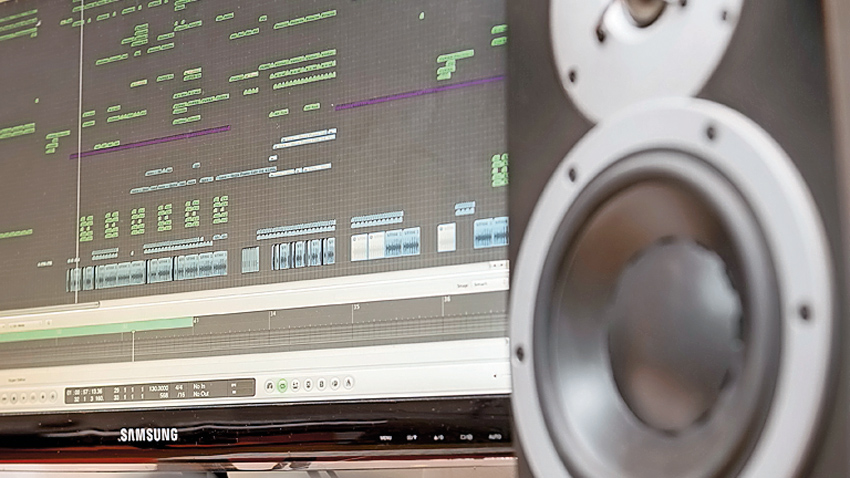Basement Jaxx's Simon Ratcliffe on their origins and comeback
"We felt on top of the world, bright and positive, and wanted the music to reflect that"

Basement Jaxx - aka Simon Ratcliffe and Felix Buxton - are one of British dance music's biggest success stories. Following their 1994 debut album, Origins, the duo's rise to the top peaked with the release of progressive house albums Remedy and Rooty, which spawned a raft of classic Top 10 singles including Red Alert, Rendez-Vu, Romeo and Where's Your Head At?.
Two Brit Awards for Best Dance Act followed in 2002 and 2004, as Ratcliffe and Buxton became in-demand remixers for prominent artists such as Missy Elliot and Justin Timberlake. Meanwhile, confirmation of the duo's burgeoning reputation arrived when Janet Jackson requested a songwriting collaboration for her album Jamita Jo.
Following the double-release of Scars and Zephyr in 2009, a five-year hiatus became a period of reflection and diversification, culminating in soundtrack work for hit monster movie Attack the Block. Basement Jaxx returned last year with the album Junto, alongside a new label, Atlantix Jaxx, and a new studio space across the river.
What were the origins of your sound and how did you meet Felix Buxton?
Simon Ratcliffe: "It was house music, I suppose. I'd been doing a thing called Tic Tac Toe, which was early hardcore jungle, then Helicopter, which was funky house. Both did well enough to buy some equipment, which formed the beginnings of a very simple studio. I had a Soundcraft Spirit Desk, one sampler, one keyboard and that was it.
"I met Felix through friends of friends; he was putting on parties around London and was really into the New York/Chicago house sound. He came to my studio with his mates and wanted to make a track, so we did a few sessions. I charged £100 a day, which Felix thought was a good deal, and we seemed to have a good understanding, so eventually it kind of filtered down to just me and Felix. Our first release, EP1, in 1994, was based on the New York house sound, I suppose. Influences were people like Masters At Work, the Strictly Rhythm label, the Nervous label, 8Ball - all these old labels, basically, and early Roger Sanchez."
Did British electronic pop influence you?
Want all the hottest music and gear news, reviews, deals, features and more, direct to your inbox? Sign up here.
"Not really, other than we all grew up with it. I was living in Wales when I was ten years old, and the first thing I ever bought was Diamond Dogs by David Bowie, only because I made a mistake and thought it was Gary Numan - who I'd seen on telly the night before. I'd watched him doing Are 'Friends' Electric? on Top of the Pops, went to WHSmith the next day, saw the cover of Diamond Dogs and thought, "That's the guy I saw last night". I subsequently ended up loving David Bowie as well, just because of that."
When did you first start experimenting with songwriting and production?
"I don't know whether it was being an only child and spending a lot of time indoors, but I've always liked making things in my own little world. I'd been in bands, but negotiating and compromising is quite hard; I just liked having that control or power to make something out of my head, and the technology was affording that. The first thing I got was a Fostex X-26 Multitracker, which my mum very kindly bought for me. That was like having a 24-track studio as far as I was concerned. I could create my own artificial band by bouncing tracks. It was limited, but I worked that thing to death and used everything it could do, using all kinds of tricks. It was very exciting times, very cool."
What did you learn about audio production during that period?
"I was in a jazz funk band in London, which was a bit of a struggle, so I started DJing beats onto the Fostex and had a Boss DigiDelay thing that had a two-second sampler. I used to sample beats and loops into that and do sequencing by pushing it with my foot or hand in time to the Fostex. That's how I started making rave music, really; there were no computers involved whatsoever. My first track was called Tic Tac Toe and it achieved 'cult status' in the drum 'n' bass world - even Goldie still keeps going on about it. I basically did it all on my Fostex. Then my mates, who were really supportive of me, said, 'Man, this is wicked let's cut it… we'll rent you some equipment for a weekend and make a white label'. So they rented me a sampler and a reel-to-reel from a studio hire and I suddenly had all this stuff, but didn't know what to do with it. I didn't understand the concept of MIDI and basically had to recreate what I'd done on the Fostex. I kept calling the hire guy up all hours of the night saying, 'Hello… it's me again, sorry', and he was getting really pissed off, like if you don't know how to use MIDI, what are you doing with these samplers?"
"My first track was called Tic Tac Toe and it achieved 'cult status' in the drum 'n' bass world - even Goldie still keeps going on about it."
Did that trial and error approach to using hardware give you an education that soft synth users miss out on?
"Maybe. I think having an idea in mind then having to work out how to do it is fun, and if you do achieve something, you'll probably achieve it in a different way to how other people would, but that's what makes it your own. With Basement Jaxx, we were forever trying to sound as cool and sophisticated as the American stuff, and we didn't, but in the process we ended up creating our own sound. If you want to create something, you will, but you'll make it within the limitations you've got. Presets can be great, but if you don't have that inquisitiveness and creativity to want to try and do other things, I don't think you're ever going to achieve that much, really. There's no secret, there's no magic key; the people who want to achieve things will do it because they're born to do it."
Out of all the remixes you've done, which ones really stand out for you?
"Well, it's been a while since we've done a remix, but the one I think of that ticked all the boxes was the mix we did for Missy Elliot. We were huge fans and honoured to be invited to that party. The track was called For My People and we did a mix quite quickly, which they used as a single edit and cut the video to our remix. To be honest, remixes seem a bit irrelevant now because everyone's doing them. There's not much preciousness about these things any more. Everything's up for a remix; everything's being mashed up really well and the technology's there to make everything sound amazing."
You took a five-year sabbatical after Scars - what was that down to?
"We just needed a break, because we'd been on this wheel of album, tour, album, tour. We had a deal with XL Recordings, which was a five-album deal, although we actually gave them six because of the ambient soundscape album Zephyr, which was like a postscript to Scars. We'd been in the same studio, doing slightly the same routine for over a decade, so it kind of made sense to freshen up and do something different. I did a solo project called Dorus Rijkers, which was an electronic jazz fusion sort of thing, which I want to do more of. It's definitely niche, but a great joy to do."
You also went into film scores…
"We did two film sound scores - Attack the Block and an American Documentary called The Hooping Life, which is about the hula hooping resurgence in America - so we were quite busy. We were still DJing and did the odd gig with the band, and then we moved studios from Brixton to Kings Cross, so basically had three years off. Two years ago, we started working on Junto in earnest; we thought the musical landscape seemed to be in our ballpark - that groovy, soulful house vibe was all cool again, jazz is not a dirty word any more, and that aesthetic has shifted in our favour."
Was working on the soundtrack to Attack the Block an eye-opener?
"An exciting thing for us was to do film soundtracks, to see what else we could apply our knowledge and creativity to. We put the word out that we were up for it and spoke to a few people; one of them was Joe Cornish, who was doing his first ever film. We liked him very much and he showed us a very rough draft of the film, but he was really nervous and under a lot of pressure. If we'd said, 'This is shit', he would probably have broken down in tears. As it turned out, he did an amazing job and I enjoyed doing the film score. Compared to writing an album, where the possibilities are endless and you're forever trying to find this perfection, you don't have time with a film because they've got deadlines."
What did you learn from the whole process?
"We worked in conjunction with Steven Price, who won an Academy Award for doing the music to Gravity. He's a traditional film scorer, but there's a whole technical side to film scoring; it's very tricky how the music is applied to the picture, how they stretch bits and get things in time. We did what we did, but Steve acted as the middleman between us and Joe, and made sure the time codes all fitted technically.
"With albums, it's all about, 'What does this say about society?' and, 'Does this lyric really resonate?' - you can go on forever crawling up your backside. I like the anonymity of film scores."
"The Hooping Life was even more extreme because they were in LA, so we'd Skype and they'd give us some references, but even with Skype there can be misunderstandings and, if someone goes off working based on a misunderstanding, five hours could be wasted. Amy Goldstein just said, 'Fuck it', flew over to the studio and sat there with us for three or four days. We worked around the clock and got the whole thing done.
"With albums, it's all about, 'What does this say about society?' and, 'Does this lyric really resonate?' - you can go on forever crawling up your backside. I like the anonymity of film scores; there's a freedom because you're asked to do tempos that are up and down, all over the place, but at the same time you're restricted, and the dialogue and sound effects come way ahead of any kind of music, which is good for your ego. I think it's a good way for ageing musicians to go."
Was there anything you learned that you could carry into the new album, Junto?
"Definitely, the discipline of just getting something done and finishing it. With Junto we knew we had a deadline to meet if we wanted it to come out in 2014. We had a frantic last three or four days; in that period, I think we got more stuff done than we did in the previous three or four months."
Is it mixing that causes a lot of delays?
"It's one and the same thing to be honest. With the music that we do, as you know, the way a record feels, the way it makes you feel and its position in the world is based on its sonics - or a lot of it is. There's a message in the sound that says where you're coming from. A song can sound really cool and seductive or awful and cheesy, depending on the instrumentation, what kind of kick drum you use or how much space there is in the mix. That aesthetic is an integral part of what the song says and how people judge it within the first 20 seconds of hearing it."
The first thing we noticed was that your artwork has changed - no more cartoon animals. Was that a rebranding exercise?
"It was a bit, yeah; we'd done all that and wanted to do something clean and fresh that symbolised the new age that we feel is upon us. Something that seemed to be mysterious but bright, positive and hopeful - like a window into a new world. The last album we did, Scars, was a bit sombre in its tone, even the name: Scars. We felt a bit damaged by everything; but this time we had a studio with big windows and a view of London. We felt on top of the world, bright and positive, and wanted the music to reflect that, and also have music we could DJ in clubs or that people could put on during a barbecue to make them feel good."
You've always worked with a lot of vocalists but you rarely choose well-known artists…
"We did it in the way we always used to. When we started, there were no celebs or anything. When we used Dizzee Rascal, he wasn't known at all. We just sort of use people that fit. We're so used to X-Factor people who sing very well, very professionally. They've got the expression and hit the high notes, but it leaves me completely cold - it feels like a factory. You're looking for a human being, and things like honesty, fragility, expression and emotion; imperfections, I suppose. We find vocalists in many ways - we even checked out people on YouTube."

You have a new studio in North London. Why did you move?
"It wasn't much of a move. Some bands move to Berlin or LA; we just moved north of the river. We recorded Remedy and Rooty in Camberwell, just down the road from Brixton. We'd shared that studio with other people and had to call up and haggle over studio time. We were using JBL wedding speakers. To hear the bass, you had to put your head in the corner of one part of the room and you had to stand outside to hear the vocals. That studio was always meant to be a stop-gap, but we ended up there for 12 years. The roof was leaking, it was getting smelly, and there were no windows. It was in Loughborough, which I think was top of London's shooting blackspots a few years ago - and there wasn't anywhere nice to get a sandwich. We thought we should brighten up our lives a bit and get a studio more suitable for a professional music-making duo, so we went up to SSL in Oxford and got this desk from them. It's four or five years old, a digital/analogue hybrid."
What other hardware do you have?
"We started using a Juno-106 keyboard again, which is nice. You can't imagine now, but six or seven years ago, people would not be interested in those sounds. Then you had a new breed of producers who were using analogue synths again. When we recorded Remedy, we had an Atari sequencer; press go and all the lights would start blinking because everything's talking - all these little organisms doing their own thing. It's all a little bit unpredictable, and tunings go up and down and timings go a bit. On Junto, I played guitar and bass, and we had live brass, while some of the music was recorded on location in Paraguay and Kenya. We also used an old Moog Voyager, a Prophet 6 and the Korg EMX2, but most of it is done in the box, using Logic."

Do you work side by side?
"We used to work together in the studio, but now we have the luxury of having a mixing room, a writing room and a vocal/live room. All of them are sizeable and have computers in, so I'd say at least half of this album we were working in completely different rooms to each other. We'd swap roles and rooms, whereas in the past we'd always be stuck in one room together, hammering over something. Felix listens to one aspect and I listen to another, and he doesn't really hear what I'm hearing and I don't really hear what he's hearing, but it gets to a certain point where we both think it's cool."
"Felix listens to one aspect and I listen to another, and he doesn't really hear what I'm hearing and I don't really hear what he's hearing, but it gets to a certain point where we both think it's cool."
Would you consider using an outside producer?
"On this album, we were probably more open to input than at any other time. We had Warren Brown helping us, Duncan Brown, and Michel Cleis, who worked on Mermaid of Salinas. There were definitely times when we were looking at each other and thinking we need to get a producer in here.
"The thing is, we are producers. Before we were signed, we saw ourselves as Masters at Work, in the background, producing singers; and somehow we ended up becoming the act. We still see ourselves as producers, but at the same time, we could have done with Rick Rubin coming in the room and going, 'Ditch that, that's cool, ditch that'. A producer who can edit and make quick, honest, well-judged decisions."
Has Logic always been your DAW of choice?
"We were quite late coming to that scene. After our first two albums, all the American producers came round to our studio and were almost in hysterics laughing at how old-fashioned our equipment was. They were tech-heads and we were never tech-heads; if something's not quite sounding right, put some cotton wool on it and see if it helps. The stuff we're probably most known for had all the vocals recorded to DAT, then we went back and sampled the best bits through the sequencer, which was a long-winded and cack-handed way of doing it."

So when did you start using Logic?
"On Kish Kash, around 2003. We heard the stems from Good Luck the other day, which was a big track for us, but it was really ropey - full of clicks and glitches because we hadn't got the hang of Logic and weren't treating the files with much care. Now it's like picking up a guitar. Once it does what you want, it kind of stops there, really, even though I know Logic's capable of going a lot further. I probably like the sound of Ableton more; there's something crunchy about it that I like, so I need to start exploring that when I have the time."
Are you always expanding your sound library?
"We used to, but now, with things changing so fast, you'll hear a new kick drum from somewhere and think, 'Oh my God, that's better than what we had last week'. The aesthetic is always shifting. Also, we constantly try to listen to the music around us to make sure that what we're doing is relevant, which, when you've been going as long as we have, becomes a bit more difficult. You have to keep on your toes and keep referencing; it's all about the nuances in the sound and the sonics - that's more important now than ever. When we started, a lot of house music - we used to call it punk garage - was made for next to nothing by people in bedrooms with no money. It was rough and raw and ready, and for us that was part of its charm. Thankfully, we DJ a lot, so we're up to speed with what's going on; it keeps us connected."


Future Music is the number one magazine for today's producers. Packed with technique and technology we'll help you make great new music. All-access artist interviews, in-depth gear reviews, essential production tutorials and much more. Every marvellous monthly edition features reliable reviews of the latest and greatest hardware and software technology and techniques, unparalleled advice, in-depth interviews, sensational free samples and so much more to improve the experience and outcome of your music-making.
